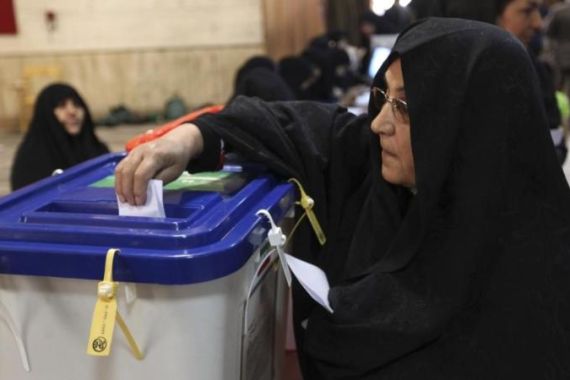Phony democracy in Iran
Iranians should be able to vote for whomever they wish, not the select few chosen by the Council of Guardians.

Iranians have been heading to the polls today to choose their next president. Mahmoud Ahmadinejad, who has served the maximum two consecutive terms allowed by the Iranian constitution, cannot stand for re-election in this poll – and, until recently, the field of candidates looking to succeed him was broad. But that list was dramatically reduced in the past month when the all-powerful Guardian Council, handmaidens of Iran’s Supreme Leader, Ayatollah Ali Khamenei, drew a red line through the names of literally hundreds of would-be candidates who, in the Council’s view, were not sufficiently loyal to the Supreme Leader.
This is what passes for democracy in Iran.
The Guardian Council’s editing of the candidate list will ensure that the next president of Iran is a loyal supporter of the theocratic regime that has ruled the nation since Ayatollah Ruhollah Khomeini swept to power during the Islamic Revolution of 1979. But this phony exercise in democracy will not give voice to the discontented majority of Iranians who long for a government respectful of their rights and responsive to the urgent challenges now facing the nation.
Among those challenges is a collapsing economy that has turned the Iranian rial, once one of the world’s most stable currencies, into the equivalent of the Weimar-era Deutschmark. Sanctions imposed upon Iran for its continuing defiance of the International Atomic Energy Agency’s (IAEA) efforts to determine whether Iran is producing weapons-grade uranium have taken their toll on the economy, and Western nations are warning of even tighter sanctions in the months ahead, if Iran continues to stonewall the IAEA.
In addition to growing concerns about the prospect of a sanctions-induced economic collapse, there is fear of nuclear war itself. History tells us that real democracies have never fought a war against one another. But Iran is only a phony democracy, and the continuing development of its nuclear weapons capability increases the possibility that these weapons could be used to launch a nuclear conflict that would have a devastating impact on Iran and the world.
The Iranian people are also worried about the potential consequences of the regime’s dangerous political ambitions in the Middle East. The Syrian revolution, pitting a majority of the Syrian people against an embattled President Bashar al-Assad, has ominous implications for the Iranian regime, one of Assad’s few remaining allies. Should Assad fall, Khamenei and his loyalists will lose their “bridge” to Hezbollah, weakening their position as a power-broker in Middle East politics.
Tehran has, of course, doubled down on its defiance of the IAEA and its support for Assad and Hezbollah. But the people of Iran are beginning to sense the desperation of the regime and to worry that reckless decisions by its embattled leaders will lead to further hardship, or to a catastrophic war against Israel and/or the West.
We, the undersigned, formed Unity for Democracy in Iran (UDI) a little more than a year ago with one purpose in mind: to give voice to the democratic aspirations of the people of Iran. UDI is not a political party, and is not fielding candidates in this presidential election. What the organisation does is to shine a light on the electoral process itself, and in so doing, hold the regime to account.
Arguably, there are dozens of criteria for truly free and fair elections. But in our view, there are three that are essential:
1. Any Iranian should be allowed to run for office, and every Iranian should be able to vote for the candidate of his or her choice.
2. Every candidate should be free to campaign without fear of persecution or prosecution.
3. The electoral process should be open to international observers and inspection.
Were the regime to honour these basic democratic “rules of the road”, the Iranian people would, at long last, have an opportunity to choose a government that represents their hopes and desires. We believe that leaders who govern with the support of their people would not hesitate to embrace these democratic principles. We are, however, not optimistic that any of these standards will be met in the upcoming election.
As Iranian patriots, we believe that it is time for our nation to make the transition from theocracy to democracy. We were once a democratic nation and we can be so again. Today, Iran is drowning. But democracy – true democracy – can be our nation’s life raft.
Hassan Shariatmadari, the son of Grand Ayatollah Shariatmadari, is a physicist, lawyer, and Islamic scholar. Active in opposition politics, he was a co-founder of National Republicans of Iran in 1983 and United Republicans for Iran in 2004.
Mohsen Sazegara was a founding member of the Iranian Revolutionary Guards Provisional Command Board and formerly Deputy Prime Minister for Socio-Political Affairs and Director of Iran’s state radio.
Djavad Khadem served as Iranian Minister of Housing and Development in the government of Shapour Bakhtiyar, the last prime minister to serve before the Iranian Revolution. Khadem escaped to France in 1980 to help form the National Resistance Movement of Iran.
Shahriar Ahy is the former CEO and Chairman of the Executive Committee of ARA Group International (“AGI”), a media holding company whose daughter companies included MBC, the first pan-Arab radio and television network.
Abdollah Mohtadi is the leader of the Komala Party of Iranian Kurdistan. Abdullah has written extensively about Kurdish and Iranian politics.
Fereidoon Ahmadi is a leading member of the Fedaeean-e-Khalgh Organization and a former Iranian political prisoner.
